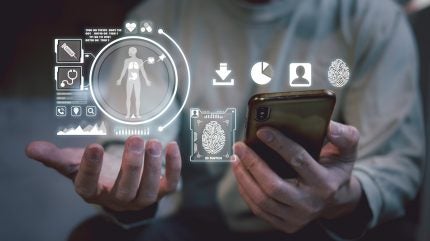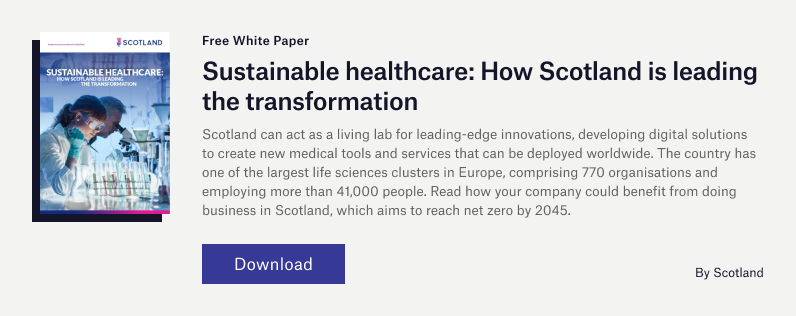
Remote monitoring technologies are helping to improve the health of patients in Scotland living with drug addictions and chronic care conditions.
This is especially important given the increasing demands on health services. Drug addiction, particularly opioids, continues to have debilitating effects on individuals and society – and this trend is predicted to continue. GlobalData projects that, based on current levels, a further 2.49 million people worldwide will be diagnosed with opioid addiction by 2027, including an increase of more than 298,000 in the UK alone.

Aside from the severe health consequences of drug addiction, studies have confirmed a direct link between regular opioid use and the development of chronic obstructive pulmonary disease (COPD).
However, managing addiction and related health problems is becoming increasingly costly and inefficient for health services under mounting pressure in terms of resources and budgets.
For example, in England, nine in every 1,000 people were admitted to hospital with ambulatory care sensitive (ACS) conditions in 2023–24, according to the Office for National Statistics. In the same period, 22 people in every 1,000 were admitted with urgent care sensitive (UCS) conditions.
ACS and UCS conditions are considered treatable at home or in communities, with hospital admission only intended as a last resort. Yet the higher rate of ACS and UCS conditions being admitted to hospital is a cause for concern. This is especially true for people living with drug addictions, who can be prone to overdoses, as well as additional unpredictable health conditions such as COPD.
As a leading healthtech research hub, Scotland is emerging as a key developer of remote monitoring devices that can prevent unnecessary hospital admissions and reduce the demand for healthcare services. When integrated with AI and the Internet of Things, these devices can model patient health and signpost the need for early interventions, helping to provide treatments at critical moments.
The immense potential of remote monitoring in healthcare
Technology offers considerable benefits for the delivery of healthcare services, particularly with remote monitoring capabilities.
According to the GlobalData Medical Equipment Markets Database, the worldwide patient monitoring market is worth an estimated $18.25bn in 2024. By 2033, this will rise to $23.9bn. Scotland has all the capabilities to secure a decent share of this market, evidenced by the growth of specialist remote monitoring companies in the country.
“Remote monitoring has the potential to revolutionise healthcare,” says Craig Turpie, co-founder and chief operating officer at Edinburgh-based Lenus Health. “It should be able to enhance patient engagement with their care and enable interventions to be made that keep them out of hospital. I think it will provide a more proactive and preventative approach to healthcare.”
Treatment of patients with acute COPD is often highly reactive, with patients receiving treatment once their condition is severe enough to require hospital attention. Remote monitoring, coupled with risk stratification, offers the opportunity for more personalised care while freeing up capacity within healthcare systems.
Advances in ML also mean that the vast amounts of data collected by remote monitoring, including from wearable devices, can be analysed more effectively than ever before.
“We connect patient-generated data with electronic health records and identify patterns, enabling risk stratification,” explains Turpie. “Our models can risk-stratify COPD patients, providing clinical decision support tools to care teams so they can intervene early, again, with the promise of trying to keep patients out of hospital by treating them at home.”
Innovations in Scotland to tackle opioid addictions
The potential support remote monitoring could provide to traditional clinical settings such as hospitals and GP surgeries is only starting to be realised. Innovative new companies are making use of the volumes of data that medical devices collect in real time to improve healthcare support systems for vulnerable patients.
Founded in Scotland, PneumoWave is an innovative medtech company that has developed a remote monitoring device that measures chest movement to supervise patients at risk of sudden death – such as those with opioid addiction or epilepsy. These conditions can often cause patients to stop breathing and require urgent treatment.
PneumoWave tracks chest movements every five seconds. When the device detects any abnormalities, it immediately sends an alert to someone the patient has chosen to be notified – either a friend, family member or emergency medical responder.
Acting as a real-time alert of respiratory depression, the PneumoWave Alert device could also be used to prevent sudden infant death syndrome (SIDS), as well as a variety of highly prevalent unexplained deaths post-hospitalisation. In a sign of its market potential, the company has expanded operations to include a US headquarters in South Carolina.
“Over the past year, we have been building out the infrastructure to support sales post-regulatory clearance,” explains Richie Bavasso, president and director of PneumoWave. “We expect our first FDA clearance of many in the second quarter of 2025.”
Managing COPD through remote monitoring tech
Scientists have demonstrated that there is a clear link between opioid addiction and developing COPD. However, ground-breaking new remote monitoring devices connected to AI software are also improving treatments for this debilitating condition.
At Lenus Health, Turpie has seen the company’s Lenus Stratify® solution deployed in services provided by NHS Greater Glasgow and Clyde. The solution is designed to support patients with COPD and can identify signs of deteriorating health to pre-empt hospital admissions and readmissions.
Lenus Stratify® is a software as a medical device (SaMD), comprising a suite of AI models that have been developed in partnership with world-leading clinicians. The models deliver risk scores across a range of vectors including hospital admission and readmission risk across different time windows, mortality and near-term emergency admission risk. Risk scores provide care teams with actionable insights to inform appropriate treatment interventions for patients to help keep them at home and out of hospital.
“These models provide support to multidisciplinary clinical teams that are presented with risk stratification and other patient information in a comprehensive clinical dashboard. It allows them to monitor patients and inform treatment interventions,” explains Turpie. “Often, patients may be unaware of their condition and the data allows for the care team to step in before the condition gets worse.
“That might be as simple as the care team making contact with the patient and encouraging them to do their breathing exercises, through to intervening in the community. We have been able to demonstrate that the technology can keep patients out of hospital through use of our predictive analytics, getting ahead of issues before they become critical.”
A dynamic healthtech ecosystem in Scotland
Turpie believes the future applications of remote monitoring tech in healthcare are “‘almost limitless”, with key progress being made in Scotland.
“By making connections between different data that resides within healthcare systems, and data generated by patients themselves, it creates the potential for more sophisticated models and AI to be developed that can provide more accurate predictive analytics,” he says. “I think the convergence of AI, big data that sits in health record systems, genomics and IoT is going to continue to push the boundaries of what remote monitoring technology can achieve.”
Turpie cites Scotland as an ideal location for scaling a business such as Lenus Health due to the “enabling and supportive policy backdrop across government, across the NHS and across academia”.
“Scotland has a pretty enviable reputation as a world-class research space within life sciences,” says Turpie. “There is a highly skilled workforce, particularly in pharmaceuticals and engineering but also within computing and data science. A lot of universities in Scotland are helping to develop talent that is well-matched for enterprises like ours.”
Furthermore, Scotland’s strengths in talent, healthtech and healthcare delivery are attracting global interest.
“I think most cities in the US would be very envious of the quality of clinical and engineering talent that is being trained and educated in Scotland,” adds Bavasso. “Additionally, because costs are lower in Scotland than in the US, companies can realise a significant return on investment by staffing operations here.”
Home to a variety of innovative and dynamic healthcare start-ups, the Scottish healthtech ecosystem enables technologies and tech solutions to be developed and deployed across national healthcare services.
Businesses based in Scotland can also benefit from support from government organisations such as Scottish Enterprise and Scottish Development International, which can facilitate connections with industry specialists and information about potential funding opportunities.
All these factors position Scotland as a prime location for further innovations in healthtech and improve the quality of treatments for patients.
To learn more about the sustainability drive within Scottish healthcare, download the free report below.

